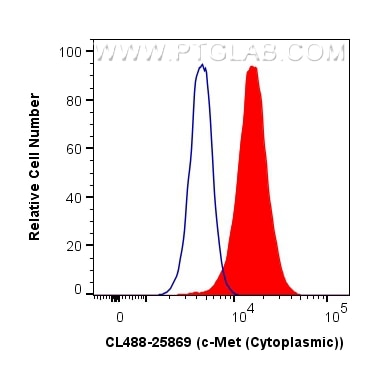- Featured Product
- KD/KO Validated
c-Met (Cytoplasmic) Polyklonaler Antikörper
c-Met (Cytoplasmic) Polyklonal Antikörper für FC (Intra)
Wirt / Isotyp
Kaninchen / IgG
Getestete Reaktivität
human, Hund, Maus, Ratte
Anwendung
FC (Intra)
Konjugation
CoraLite® Plus 488 Fluorescent Dye
Kat-Nr. : CL488-25869
Synonyme
Galerie der Validierungsdaten
Geprüfte Anwendungen
| Erfolgreiche Detektion in FC | HeLa-Zellen |
Empfohlene Verdünnung
| Anwendung | Verdünnung |
|---|---|
| Durchflusszytometrie (FC) | FC : 0.40 ug per 10^6 cells in a 100 µl suspension |
| It is recommended that this reagent should be titrated in each testing system to obtain optimal results. | |
| Sample-dependent, check data in validation data gallery | |
Produktinformation
CL488-25869 bindet in FC (Intra) c-Met (Cytoplasmic) und zeigt Reaktivität mit human, Hund, Maus, Ratten
| Getestete Reaktivität | human, Hund, Maus, Ratte |
| Wirt / Isotyp | Kaninchen / IgG |
| Klonalität | Polyklonal |
| Typ | Antikörper |
| Immunogen | c-Met (Cytoplasmic) fusion protein Ag23140 |
| Vollständiger Name | met proto-oncogene (hepatocyte growth factor receptor) |
| Berechnetes Molekulargewicht | 1390 aa, 155 kDa |
| Beobachtetes Molekulargewicht | 145 kDa |
| GenBank-Zugangsnummer | BC130420 |
| Gene symbol | MET |
| Gene ID (NCBI) | 4233 |
| Konjugation | CoraLite® Plus 488 Fluorescent Dye |
| Excitation/Emission maxima wavelengths | 493 nm / 522 nm |
| Form | Liquid |
| Reinigungsmethode | Antigen-Affinitätsreinigung |
| Lagerungspuffer | BS mit 50% Glyzerin, 0,05% Proclin300, 0,5% BSA, pH 7,3. |
| Lagerungsbedingungen | Bei -20°C lagern. Vor Licht schützen. Nach dem Versand ein Jahr stabil. Aliquotieren ist bei -20oC Lagerung nicht notwendig. 20ul Größen enthalten 0,1% BSA. |
Hintergrundinformationen
c-Met (also named as MET or HGFR) is a receptor tyrosine kinase that transduces signals from the extracellular matrix into the cytoplasm by binding to HGF ligand. c-Met regulates many physiological processes including proliferation, scattering, morphogenesis and survival. The primary single chain precursor protein is post-translationally cleaved to produce the alpha and beta subunits, which are disulfide linked to form the mature receptor. Overexpression and/or mutation of c-Met has been reported in various human malignancies, including lung cancer, breast cancer, head and neck cancer, gastric cancer, colorectal cancer, bladder cancer, uterine cervix carcinoma, and esophageal carcinoma, c-Met could serve as an important therapeutic target (PMID: 26036285). The c-met receptor is a 190-kD glycoprotein consisting of a 145-kD membrane-spanning beta chain and a 50-kD alpha chain (PMID: 7806559). In Western blot, this antibody produces bands of unknown identity at 55 and 100 kDa.
Protokolle
| Produktspezifische Protokolle | |
|---|---|
| FC protocol for CL Plus 488 c-Met (Cytoplasmic) antibody CL488-25869 | Protokoll herunterladen |
| Standard-Protokolle | |
|---|---|
| Klicken Sie hier, um unsere Standardprotokolle anzuzeigen |


